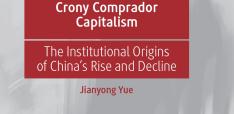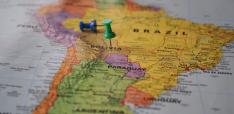New Zealand’s New Government: “Capitalism must regain its human face”

Nina Hall asks what the New Zealand election can tell us about global political shifts?
Yesterday New Zealand’s new government was sworn into office. At its helm is a young, dynamic woman, Jacinda Ardern, the leader of the Labour Party. Labour will be in coalition with the anti-establishment party, New Zealand First, and with the solid support of the Green Party. The decision came as a surprise to many - after all the centre-right National party won more seats (56) than Labour (46) but were still short of the 61 seats required to form government. New Zealand First became the kingmakers with 9 seats, and for two weeks, all of New Zealand waited with bated breath to see who leader Winston Peters would choose to crown.
On October 19th, Peters’ announced his decision to form a government with Labour live in a press conference on the evening news. He had not previously informed the parties of his decision. He explained that: “Far too many New Zealanders have come to view today's capitalism, not as their friend, but as their foe. And they are not all wrong. That is why we believe that capitalism must regain its responsible - it’s human face. That perception has influenced our negotiations.” He saw Labour and New Zealand First sharing a vision for New Zealand.
What is that vision? And what does it mean to have an economically and socially conservative party in power with a charismatic, dynamic leader of the left-of-centre Labour party? Ardern is 37 years old and represents a major generational change. She has been in parliament since 2008, and this year won the Mt Albert electorate (the seat of former Prime Minister and Labour leader Helen Clark). In contrast, Peters, at 72 years old, is an aging politician who was first elected to parliament two years before Ardern was even born, and many tip this to be his last term. Peters’ will be Deputy Prime Minister and Foreign Minister, and his party have four Ministerial roles (three in Cabinet and one outside). The ongoing support of New Zealand First is essential for Labour to stay in power. The Greens will also play a crucial role in the new government – offering confidence and supply – and have three Ministers outsider of Cabinet.
There are several policy areas that unite Labour and NZ First: helping New Zealanders in poverty, cutting immigration, imposing stronger limitations on foreign investment in Free Trade Agreements.
Firstly, both parties have a shared belief in the role of the State and public spending to assist New Zealanders, particularly those in poverty. On the campaign trail Ardern outlined targets to lift 100,000 children out of poverty by 2020 and proposed changes to ensure families in need would get an extra NZ$60 a week. Ardern has suggested she would officially measure child poverty and pass a law to ensure the Government published these numbers every Budget. Ardern has also emphasised her commitment to "ending homelessness". New Zealand First campaigned on strong platform of economic nationalism which they see as the best way to combat poverty. At party conference delegates supported a universal child allowance for every child 16 and under. The Labour-New Zealand First coalition agreement outlines plans to: secure free doctors’ visits for all under 14s, increase funding for organizations combatting domestic violence, and pilot counsellors in primary schools.
Secondly, both parties campaigned on cutting immigration. Labour campaigned to cut net immigration numbers by about 20,000 to 30,000 a year. (In the year to August 2017 net migration was 72,100). This plan has not changed. NZ First campaigned to reduce numbers even further but did not persuade Labour in negotiations. Although a nationalist party, NZ First has not gone as far as Trump or other far-right parties in Europe in xenophobic statements.
Labour and New Zealand First share a common concern that international free trade agreements threaten NZ’s sovereign capacity to legislate in the national interest. Labour wants to renegotiate some existing trade agreements (such as with South Korea) and wants major changes in the Trans-Pacific Partnership-11 agreement, the subject of on-going talks between eleven states since the withdrawal of the US. Ardern and Peters’ campaigned for provisions to stop non-resident foreigners purchasing houses, both see this driving up property prices. New Zealand First campaigned successfully for a comprehensive register of foreign-owned land, and this is now a government plan. It is possible to put in place such provisions and still sign free trade agreements - in the 1992 Maastricht Treaty, Denmark secured a special protocol to restrict foreigners from purchasing second homes.
The two parties also have overlap in other areas such as climate change and conservation. Ardern has already announced an extremely ambitious programme, spurred on by the Green Party. The new government has set a net goal of zero carbon emissions by 2050. Labour will make legally binding emissions reductions targets, and establish a new independent climate commission. New Zealand First, unlike many other populist parties worldwide, does see climate change as a major problem; however it wants to get rid of the Emission Trading Scheme and has no practical plans for limiting emissions, although it does support Ardern’s establishment of an independent climate commission, and has endorsed increases to the conservation budget.
The major difference between these parties is that New Zealand First is socially conservative and Labour is socially liberal. Thus there are likely to be divides on issues such as removing abortion from the Crimes Act and legalization of marijuana (Ardern has embraced the Green Party’s proposal for a referendum). However, the new coalition may survive these differences as the New Zealand parliament has a policy of allowing conscience votes, rather than party votes, on social issues such as abortion, using force to discipline children, and gay marriage.
So what does the New Zealand election tell us about global political shifts? It suggests that there is strong voter support for politicians who promise to address the negative impacts of globalization. Although, there are also different trajectories at play: in New Zealand the Labour-New Zealand First coalition backed by the Greens are genuinely committed to addressing poverty. Meanwhile in the US, and in European countries where right-wing populist parties have gained power, they are not.
Nina Hall is Assistant Professor of International Relations at Johns Hopkins School of Advanced International Studies. She is a New Zealand citizen.


